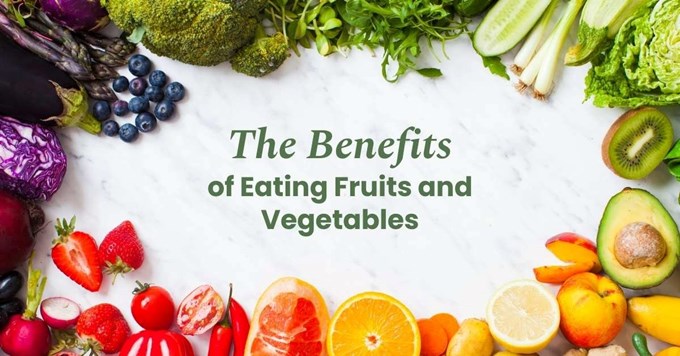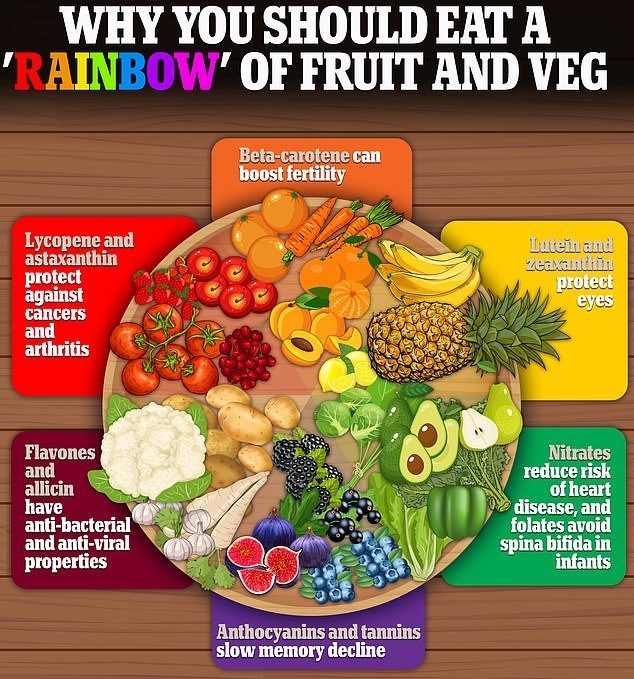Vegetables and fruits are an important part of a healthy diet, and variety is as important as quantity. No single fruit or vegetable provides all of the nutrients you need to be healthy. Eat plenty every day. A diet rich in vegetables and fruits can lower blood pressure, reduce the risk of heart disease and stroke, prevent some types of cancer, lower risk of eye and digestive problems, and have a positive effect upon blood sugar, which can help keep appetite in check. Eating non-starchy vegetables and fruits like apples, pears, and green leafy vegetables may even promote weight loss. [3] Their low glycemic loads prevent blood sugar spikes that can increase hunger. At least nine different families of fruits and vegetables exist, each with potentially hundreds of different plant compounds that are beneficial to health. Eat a variety of types and colors of produce in order to give your body the mix of nutrients it needs. This not only ensures a greater diversity of beneficial plant chemicals but also creates eye-appealing meals.
    |
 |
| Figure 1. Fruits and Vegetable |
Cardiovascular disease
There is compelling evidence that a diet rich in fruits and vegetables can lower the risk of heart disease and stroke. A meta-analysis of cohort studies following 469,551 participants found that a higher intake of fruits and vegetables is associated with a reduced risk of death from cardiovascular disease, with an average reduction in risk of 4% for each additional serving per day of fruit and vegetables. When researchers combined findings from the Harvard studies with several other long-term studies in the U.S. and Europe, and looked at coronary heart disease, they found a similar protective effect: Individuals who ate more than 5 servings of fruits and vegetables per day had roughly a 20% lower risk of coronary heart disease [13]
Blood pressure
A randomized trial known as the Optimal Macronutrient Intake Trial for Heart Health (OmniHeart) showed that this fruit and vegetable-rich diet lowered blood pressure even more when some of the carbohydrate was replaced with healthy unsaturated fat or protein. [1] In 2014 a meta-analysis of clinical trials and observational studies found that consumption of a vegetarian diet was associated with lower blood pressure. [12]
Cancer
Numerous early studies revealed what appeared to be a strong link between eating fruits and vegetables and protection against cancer. A more likely possibility is that some types of fruits and vegetables may protect against certain cancers. There was a significant reduction in breast cancer in women who had eaten higher intakes of apples, bananas, grapes, and corn during adolescence, and oranges and kale during early adulthood. No protection was found from drinking fruit juices at younger ages. [9]. Farvid’s team also found that women who ate more than 5.5 servings of fruits and vegetables each day (especially cruciferous and yellow/orange vegetables) had an 11% lower risk of breast cancer than those who ate 2.5 or fewer servings. [10]
Specific components of fruits and vegetables may also be protective against cancer. A line of research stemming from a finding from the Health Professionals Follow-up Study suggests that tomatoes may help protect men against prostate cancer, especially aggressive forms of it. Lycopene is one of several carotenoids (compounds that the body can turn into vitamin A) found in brightly colored fruits and vegetables, and research suggests that foods containing carotenoids may protect against lung, mouth, and throat cancer. [14]
    |
 |
| Figure 2. Benefits of eating Fruits and Vegetable |
Diabetes
Some research looks specifically at whether individual fruits are associated with risk of type 2 diabetes. While there isn’t an abundance of research into this area yet, preliminary results are compelling. A study of over 70,000 female nurses aged 38-63 years, who were free of cardiovascular disease, cancer, and diabetes, showed that consumption of green leafy vegetables and fruit was associated with a lower risk of diabetes. (2)
Weight
Data from the Nurses’ Health Studies and the Health Professional’s Follow-up Study show that women and men who increased their intakes of fruits and vegetables over a 24-year period were more likely to have lost weight than those who ate the same amount or those who decreased their intake. Berries, apples, pears, soy, and cauliflower were associated with weight loss while starchier vegetables like potatoes, corn, and peas were linked with weight gain. [3] However, keep in mind that adding more produce into the diet won’t necessarily help with weight loss unless it replaces another food, such as refined carbohydrates of white bread and crackers.
Gastrointestinal health
Fruits and vegetables contain indigestible fiber, which absorbs water and expands as it passes through the digestive system. This can calm symptoms of an irritable bowel and, by triggering regular bowel movements, can relieve or prevent constipation. [11] The bulking and softening action of insoluble fiber also decreases pressure inside the intestinal tract and may help prevent diverticulosis.
Vision
Eating fruits and vegetables can also keep your eyes healthy, and may help prevent two common aging-related eye diseases—cataracts and macular degeneration—which afflict millions of Americans over age 65. [4; 5] Lutein and zeaxanthin, in particular, seem to reduce risk of cataracts. [6]
References
- Appel LJ, Sacks FM, Carey VJ, Obarzanek E, Swain JF, Miller ER, Conlin PR, Erlinger TP, Rosner BA, Laranjo NM, Charleston J. Effects of protein, monounsaturated fat, and carbohydrate intake on blood pressure and serum lipids: results of the OmniHeart randomized trial. JAMA 2005 Nov 16;294(19):2455-64.
- Bazzano LA, Li TY, Joshipura KJ, Hu FB. Intake of fruit, vegetables, and fruit juices and risk of diabetes in women. Diabetes Care. 2008 Apr 3.
- Bertoia ML, Mukamal KJ, Cahill LE, Hou T, Ludwig DS, Mozaffarian D, Willett WC, Hu FB, Rimm EB. Changes in intake of fruits and vegetables and weight change in United States men and women followed for up to 24 years: analysis from three prospective cohort studies. PloS medicine . 2015 Sep 22;12(9):e1001878.
- Brown L, Rimm EB, Seddon JM, Giovannucci EL, Chasan-Taber L, Spiegelman D, Willett WC, Hankinson SE. A prospective study of carotenoid intake and risk of cataract extraction in US men. The American journal of clinical nutrition. 1999 Oct 1;70(4):517-24.
- Cho E, Seddon JM, Rosner B, Willett WC, Hankinson SE. Prospective study of intake of fruits, vegetables, vitamins, and carotenoidsand risk of age-related maculopathy. Archives of Ophthalmology. 2004 Jun 1;122(6):883-92.
- Christen WG, Liu S, Schaumberg DA, Buring JE. Fruit and vegetable intake and the risk of cataract in women–. The American journal of clinical nutrition 2005 Jun 1;81(6):1417-22.
- Christen WG, Liu S, Glynn RJ, Gaziano JM, Buring JE. Dietary carotenoids, vitamins C and E, and risk of cataract in women: a prospective study. Archives of Ophthalmology .2008 Jan 1;126(1):102-9.
- Farvid MS, Chen WY, Michels KB, Cho E, Willett WC, Eliassen AH. Fruit and vegetable consumption in adolescence and early adulthood and risk of breast cancer: population based cohort study. BMJ. 2016 May 11;353:i2343.
- Farvid MS, Chen WY, Rosner BA, Tamimi RM, Willett WC, Eliassen AH. Fruit and vegetable consumption and breast cancer incidence: Repeated measures over 30 years of follow‐up. International journal of cancer. 2018 Jul 6.
- He FJ, Nowson CA, Lucas M, MacGregor GA. Increased consumption of fruit and vegetables is related to a reduced risk of coronary heart disease: meta-analysis of cohort studies. Journal of human hypertension. 2007 Sep;21(9):717.
- Lembo A, Camilleri M. Chronic constipation. New England Journal of Medicine. 2003 Oct 2;349(14):1360-8.
- Yokoyama Y, Nishimura K, Barnard ND, Takegami M, Watanabe M, Sekikawa A, Okamura T, Miyamoto Y. Vegetarian diets and blood pressure: a meta-analysis. JAMA interal medicine. 2014 Apr 1;174(4):577-87.
- Wang X, Ouyang Y, Liu J, Zhu M, Zhao G, Bao W, Hu FB. Fruit and vegetable consumption and mortality from all causes, cardiovascular disease, and cancer: systematic review and dose-response meta-analysis of prospective cohort studies. BMJ. 2014 Jul 29;349:g4490.
- Wiseman M. The Second World Cancer Research Fund/American Institute for Cancer Research Expert Report. Food, Nutrition, Physical Activity, and the Prevention of Cancer: A Global Perspective: Nutrition Society and BAPEN Medical Symposium on ‘Nutrition support in cancer therapy’. Proceedings of the Nutrition Society. 2008 Aug;67(3):253-6.